北京市平谷二中九级英语全册《Unit 1 Leaning to Learn-part1》课件 北师大
- 格式:ppt
- 大小:1.33 MB
- 文档页数:11

Unit 1 Learning to learn(Ⅰ)Lesson 1—Lesson 2一、单元知识概述同学们,在本周大家将要了解不同的英语学习方法,学会向别人提供英语学习的建议。
所以大家需要掌握与英语学习方法有关的词汇和表达(e.g.memorize, review, recite, simple, correct, discuss, go over, over and over again, etc)。
在语法上,需要掌握由unless和if引导的条件状语从句的用法,并能熟练运用它们于口语和写作之中。
二、单元重难点解析1.Yes, there are a number of ways to help improve your memory, so you shouldn’t feel upset.[译文]是的,有很多帮助你提高记忆力的方法,所以你不用感到心烦。
(1)a number of…表示“许多的;大量的”,后接可数名词的复数形式。
还可在number前面加上一些限定词来表达不同的含义。
e.g.a large/great number of… 许多……,大量……a smal l number of… 少量的;少部分的辨析:a number of和 the number ofa number of表示“许多;大量”,而the number of…表示“……的数量”。
当两者构成的词组都在句子中作主语时,a number of后的谓语动词要用复数形式,而the number of后的谓语动词用单数。
e.g.The number of students in our class is seventy. And a large number of them are from the city.我们班学生数量是70个,其中很大一批来自城里。
(2)feel/ be upset(about…)意为“对……感到心烦”, 此处upset为形容词,表示“心烦的;不安的”。
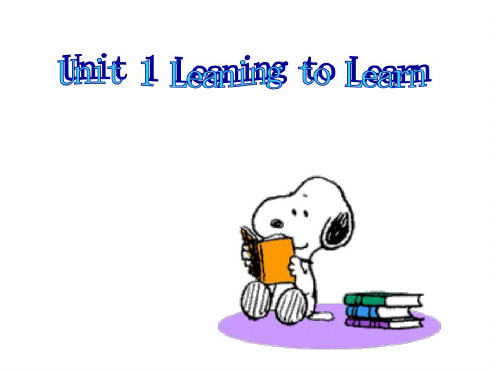
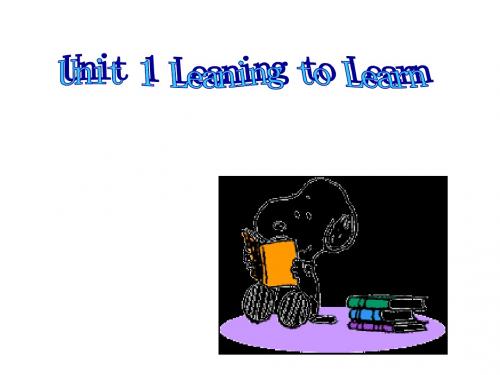
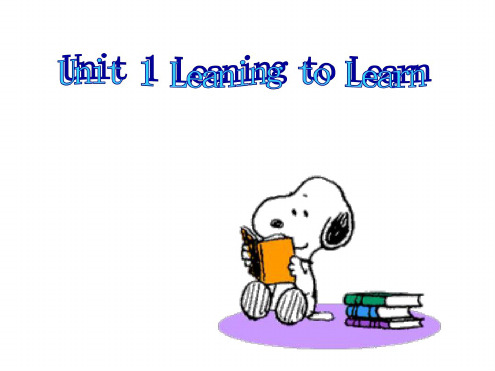
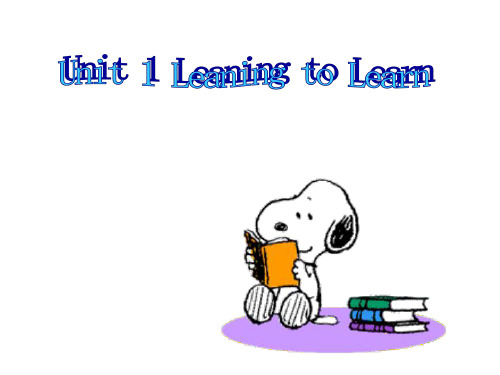
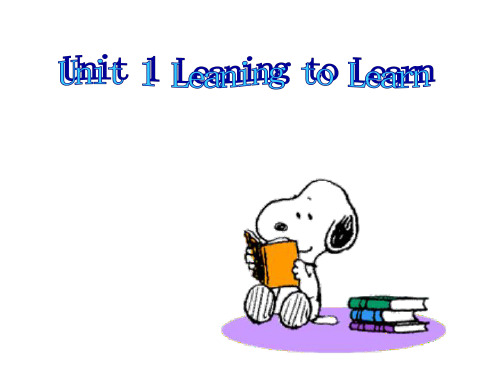
单元检测:一、知识目标:掌握词汇:key advice review recite simple alone truth correct table real voice communicate discuss hurry form tape pronunciation discussion lead express translate instruction praise sentence meaning across period role possible examine crazy quick weak slow thick impossible push理解词汇:memorize easily junior learner material colored highlight paragraph support explanation relate apologize rude textbook partner relaxed underline self_ assessment caller stress role_ play narrow掌握短语:go over go to sleep hurry up over and over again both and look up either …or…neither …nor…be afraid of掌握句式:either …or…neither …nor…not only …….but also ………语法:1. 掌握if引导的条件状语从句。
2.理解once ,unless在状语从句中的运用。
3.继续学习现在完成时,并能够运用。
4.理解may might 的运用。
二、能力目标:听:能听懂有关英语学习方法的文段。
说:能够用英语表达自己学习经历,与同学共同分享学习乐趣。
读:能够在阅读中学会在语境中猜词。
写:通过写作表达自己的学习经历。
一、单选:(每小题1分,共18分)( )1. I will not play computer games again_______ I finish my home work.A. onceB. ifC. whenD. unless( )2. Is there _______ staying in the library? It will be closed in 5 minutes.A. anyoneB. somebodyC. everyoneD. nobody( )3. Somebody must have told a lie. Let’s find out the _______.A. answerB. questionC. truthD. wrong( )4. Don’t work too hard. You put too much _______ on yourself.A. timeB. stressC. homeworkD. charge( )5. You’d better do it _______ hand, so that you can finish it quickly.A. inB. byC. onD. to( )6. Jane made a mistake, but she had a chance to _______ it to us.A. doB. run awayC. explainD. cover( )7. I don’t know what you want to _______ with your gestures.A. saysB. expressC. toldD. shown( )8. You can _______ words in a dictionary.A. find outB. look outC. look upD. find up( )9. We must _______ of the sick boy.A. watchB. take careC. take chargeD. look after( )10. _______ Tom _______ James jumps higher.A. Either, norB. Either, orC. /, orD. Both, and( )11. _______ my father _______ my mother likes this dog because they dislike its eye’s color.A. Neither, norB. Either, orC. Both, andD. /, or( )12. _______ Lily _______ Lucy are good students.A. Neither, norB. Either, orC. Both, andD. /, or( )13. Some students find it difficult to remember words _______ they are not paying attention.A. soB. becauseC. thatD. when( )14. Run more _______, or you will miss the bus.A. slowB. slowlyC. quickD. quickly( )15. I don’t know how to act this _______. He looks so terrible in the story.A. roleB. actorC. filmD. one( )16. The house is too _______ to put in more things.A. thinB. bigC. smallD. short( )17. Let’s _______ away the rock which is on the road.A. pullB. takeC. moveD. push( )18. It is _______to study English well without speaking.A. possibleB. impossibleC. easilyD. hardly二、完型填空:(每小题1分,共12分)Allen was a fourth-grade boy who hated exams. He did quite well in his everyday work. But when the teacher gave an exam, he always 1 . He couldn’t understand why he did so poorly until one day when he was talking about it to his mother. “ You’re just like your dad and me,” his mother told him. “We didn’t do well with exams either. I was afraid of them, and your dad just couldn’t work them out. He had the same problem as 2 . Healways 3until exam time.” So that’s it. Allen thought to himself: “Like father, like son. It just runs in the4 .”The next time the teacher handed out the weekly exam. Allen tried to work a few problems, then 5 . He didn’t do each problem carefully went over.The next week the teacher introduced the class to a new program called “Practice for Success.” They learned that exams were like 6 where you get a chance to 7 what you know as you play the games. Allen had never 8 exams as games in which you competed (竞争) with yourself or 9 as you do in computer games, basketball, football, or other sports. He learned how to have 10 when competing with himself. All that year Allen worked on learning how to 11 on exams. Soon he found himself not only doing well on exams, but also 12 them. He wasn’t afraid of exams any more. His mother said joyfully, “ I learned that not doing well on exams doesn’t have to run in the family.”1. A. passed B. joined C. failed D. finished2. A. everybody B. most people C. I did D. you have3. A. did poorly B. did well C. worked hard D. studied carelessly4. A. family B. exam C. class D. school5. A. at last B. at all C. at first D. as well6. A. reading B. dancing C. sports D. performances7. A. continue B. teach C. show D. improve8. A. expected B. thought C. found D. regarded9. A. your parents B. others C. your teachers D. the lessons10. A. fun B. results C. education D. a rest11. A. play well B. do better C. fail againD. follow the rules12. A. understanding B. trying C. enjoying D. remembering三、阅读理解:(每小题2分,共22分)1. What does the writer ask us to do?A. To publish our books.B. To pay him some money.C. To send him our stories.D. To leave our names.2. What we write to the writer should be ______, true and never-read.A. serious, longB. funny, longC. serious, shortD. funny, short3. In how many ways can we write to Reader’s Digest?A. 2.B. 3.C. 4.D. 5.( B )According to Gerry Smith and Shaun Belding, writers of three books on dealing with people who make troubles at the office, how you get on with the people described below can improve the working environment for everyone.(1) People who blame (指责) others including (包括) youCall them on it by saying, “Why is it always someone else’s fault (错误)?” They may laugh over what you said or become sorry. Both of them mean your point has been taken.(2) People who take your ideas as their ownPut your names on anything you write or make. If someone does it at a meeting, point it out at once – using humour (幽默) if possible. Later follow the person and tell him or her, “Don’t do that again.”(3) People who often break inDon’ t put up with it. Say coolly but firmly (坚定地), “Please wait while I finish talking.”(4) People who embarrass (使人窘迫) you in publicPut them on the hot seat by saying later, “I’m sure you didn’t want to embarrass me, but you did.”(5) People who don’t follow throughOf course you cannot order another worker, but you can try telling them they are not helpful and that you’ll report it to the boss (老板) if they go on. Then do it.(6) People who tell liesTalk straight to him or her when it’s about you. Or ask the boss for help, who can tell him or her, “There are lies going around. Can I get you to straighten them out for me?”1. What kind of people does the passage talk about?A. Those who have difficulty at work.B. Those who are making troubles.C. Those who don’t like working hard.D. Those who aren’t ready to help.2. If someone takes your invention as his own, what will you do?A. Point it out at once.B. Talk to him coolly and firmly.C. Put him on the hot seat.D. Report the matter to your boss.3. The words break in in the passage mean .A. get into a room without knocking on the doorB. shout loudly while others are having a meetingC. try to take a place which somebody else is working inD. start to talk while somebody else hasn’t finish talking4. The writer’s main purpose (目的) is .A. to teach those who aren’t doing well in their workB. to let people know how to make friends with othersC. to make the working environment better for all peopleD. to help bosses find a better way to work out problems( C )Dreams are the movies that play behind our eyes as we sleep. We dream for four hours every night but may be able to remember just one dream every few days. It’s every person’s secret life and the one that we want very much to know more about. We want to spend the night time flying, saving the world and dating the movie stars. And we’d like to both learn from and run away from our nightmares (噩梦) – animals running after us or falling down from a high building.After a century study, experts have understood a few more of the codes (密码) that run through our heads as we sleep. They offer information about where dreams come from and the role (作用) they play in our lives.First experts say you should let go off the idea that what you dream has a universal (普遍的) meaning. Even though dream dictionaries you can buy today may need something to tell bad news or something else to show good luck. But it sounds too straight to believe. “For 3,000 years people have been trying to read things into dreams as if they’re fortune cookies,” says Dr. Allan Hobson, at Harvard University. “It’s not true.”Recent study by Joseph De Koninck, at the University of Ottawa, seems to show different people have different dreams. He asked ten people to list (罗列) details (细节) of their recent dreams and make a second list of what they’d been doing in waking life. When others tried to find out who dreamed what by matching the two lists, they failed. De Koninck says, “The dreamer may be better able than other to find the details in their dreams and their daily activities.”Often our dreams may even be sounding an alarm (警告). Patricia Garfield, the writer of The Universal Dream Key, remembers a woman telling her of a dream in which her husband pushed her on a fire. “When you have these kinds of dreams, listen to them,” she says. There was clearly something wrong with the relationship (关系) between the woman and her husband, but it took the dream to make her face the real life.On this point, today’s experts agree that dreams are the subconscious (潜意识) talking with us, and that getting to know our dreams is a way to learn about ourselves.1. What do you think of the experts’ study of dreams?A. They still know nothing about dreams.B. They have more questions than answers.C. They have learned something but not all.D. They have found everything about dreams.2. What Dr. Allan Hobson says about dreams means ______.A. dreams play many more roles in our daily life than we thinkB. the same dreams have different meanings to different peopleC. dreams are just alarms to us about something in our daily lifeD. it’s wrong to study our dreams by using so-called dictionaries3. According to Patricia Garfield, the woman should ______.A. ask the police for helpB. forget all about the dreamC. leave her husband at onceD. get on well with her husband4. What conclusion (结论) can we draw from the passage?A. Dreams are nothing but part of everybody’s usual lives.B. Everything in our dreams comes from our daily activities.C. It’s possible to find answers to real problems in dreams.D. Our subconscious usually talks to us in the way of dreams.四、语言运用(10分)中考即将来临。